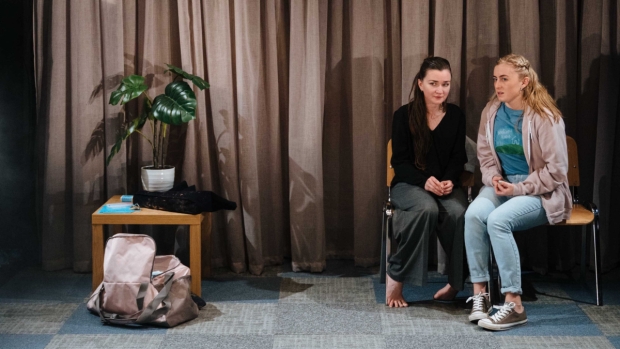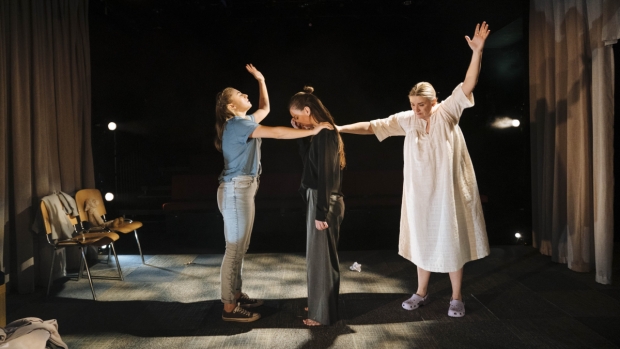”Akedah” at Hampstead Theatre review – the discursive drama examines the impact of the ‘mega-church’

© Helen Murray
Michael John O’Neill’s first full-length play, which won the Bruntwood Prize Original New Voice Award in 2019, deals with questions about religious influences in Northern Ireland. However, rather than focusing on the conflict between Catholics and Protestants, it’s the Pentecostal ‘mega-churches’ imported from America that come under scrutiny. These churches preach a version of Christianity based on extravagant displays of emotion but they also provide practical help with services for which the state has abdicated responsibility (food banks, homeless shelters), and offer individuals seeking family and community a sense of belonging. What they expect in return, however, is more problematic.
Gill (Amy Molloy) returns to her hometown on the north coast of Ireland (where on a clear day you can see Scotland) after receiving a phone call urging her to ‘come home’. Her younger sister Kelly (Ruby Campbell) grew up in the care system after their family, which had always been volatile, fell apart entirely, and at the age of 18 is in the thrall of the local mega-church. Both are muddy and barefoot after Gill mistakes a baptism in the sea for something more dangerous. Gill, who works as a night cleaner, lives an almost entirely solitary life. Kelly, meanwhile, seeks a substitute family, while clinging on to her toy lamb ‘Dead Sheep’, her one souvenir from her childhood. O’Neill’s elusive play is discursive and unfurls gradually to reveal what exactly happened to this family and why the two sisters are so damaged. Director Lucy Morrison takes a slow and measured approach that can be a touch frustrating, especially towards the beginning.
Molloy and Campbell are both excellent at capturing the fragile dynamic between these two estranged sisters who have never met as adults, with Molloy conveying the weariness of having to grow up before she was ready and Campbell the excitement of an opportunity that she’s never had before, tempered with underlying doubts. Naomi Dawson’s stark set design is like a waiting room, which works on a metaphorical level.

© Helen Murray
It’s let down by the contrived twist when the third character, Sarah (Mairead McKinley), is introduced and while it tries to end on a note of hope, there’s nevertheless the feeling that Gill is too damaged to help Kelly and vice versa. It is clear that the church is a cult (Gill wryly notes that Americans know how to ‘do God’ by putting on huge spectacles in their massive backyards) and a dangerous operation. The way in which Alexa doesn’t recognise Kelly’s ‘Holy Bangers’ playlist exemplifies how the whole operation is built on manipulation. This is an important subject (these churches continue to grow in wealth and influence all over the world) and O’Neill creates real empathy for these poor lambs, though there’s a slight lack of meat on the bones of this play.














